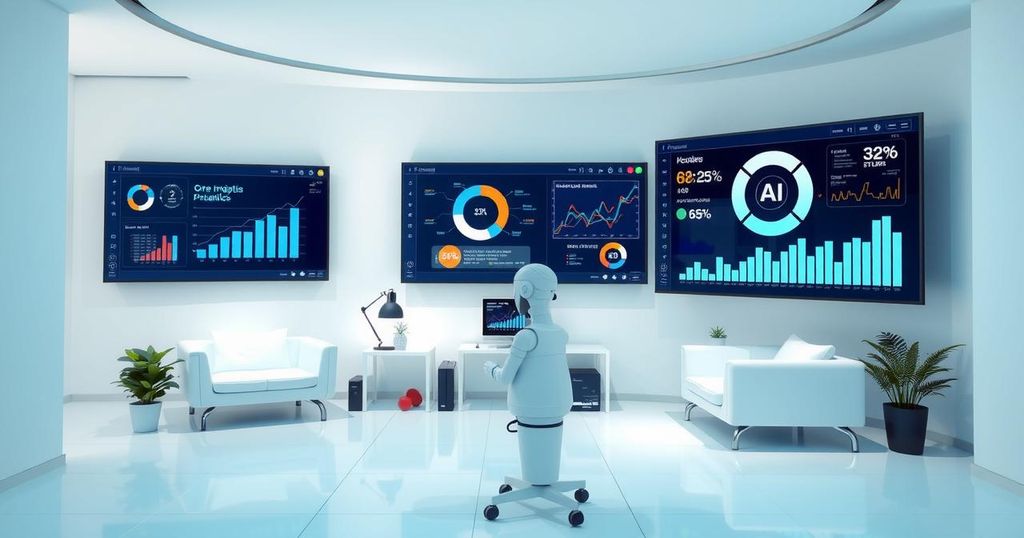The AI Advantage: How Artificial Intelligence is Reshaping Business Operations
AI is fundamentally shifting the way businesses operate, enhancing efficiency and decision-making. Its integration in various sectors—from manufacturing to customer service—is more about collaboration than replacement. As AI becomes more accessible, even small businesses can leverage its power. However, issues like data bias and accountability need attention as we navigate this evolving landscape.
Artificial intelligence (AI) has made a leap in just a few years from a tech fancy term to an everyday player in the business world. While often the media punches up stories about robots, AI is more quietly reshaping the gears of daily operations for many companies far and wide. This transformation isn’t just flashy tech; it’s about routine tasks seeing a noticeable uplift when bolstered by AI’s capabilities.
AI is infiltrating all layers of businesses, from the smallest shops to gigantic corporations. In manufacturing, predictive maintenance can spot issues before machines stumble. Think retail here—AI can fine-tune inventory based on what customers are likely to want next. And in healthcare? AI is the behind-the-scenes engine managing appointments and secure data without a fuss. The message is clear: AI isn’t here to replace humans; it’s making the work we do smarter and more efficient across the board.
In the words of Dr. Monica Sethi from the London School of Economics, “The real shift isn’t about machines taking over jobs—it’s about AI enhancing what humans already do.” AI quietly works as a digital assistant, helping reduce the annoying bumps from the daily grind of office tasks.
One of the freshest contributions of AI? That’s its knack for turning tidal waves of data into useful insights almost instantly. Businesses today can drown in customer data or log trends, but few can really make sense of it all. Enter AI to save the day.
With logistics, for instance, you’ve got AI navigating delivery routes with traffic changes in real-time, or eCommerce sites cranking out tailored product recommendations nearly within the blink of an eye. And in finance, spotting fraudulent activity has never been juggled so swiftly, outperforming even veteran human analysts. More than just speed, these intelligent systems can pinpoint opportunities and patterns we might overlook.
Automation gets tossed around like a blanket term for AI, but there’s more to the story. Effective AI integrations focus on streamlining workflows not just shoving employees out the door. Customer service, for instance: AI chatbots can zap most basic queries right away, letting human agents handle nuanced customer issues. In finance, time-consuming reconciliations are automated, pinpointing discrepancies faster than a person could.
This blend of AI handling routine tasks and humans tackling strategic decisions is catching fire. A Deloitte study even revealed that companies automating admin tasks with AI saw a boost of up to 40% in operational efficiency—without letting anyone go.
The playing field for smaller businesses is leveling out too! Thanks to the rise of affordable cloud-based AI platforms, smaller entities can finally tap into this tech. A neighborhood legal firm can harness AI for drafting documents just like larger firms. A local barista can predict coffee orders by taking advantage of machine learning. More businesses are now equipped to adapt rapidly and smartly like their larger counterparts.
Yet, it’s not all shining bliss with AI. Challenges persist, like bias in training data that skews results or opaque ‘black box’ systems that raise eyebrows. Just look at that Australian retailer’s pricing algorithm incident during a regional crisis—price spikes and tarnished reputation were the outcome.
Experts stress that oversight through audits and human control is essential. As Dr. Sethi puts it: “AI should assist decisions, not make them unilaterally.” A fair, accountable governance framework surrounding AI usage is non-negotiable.
As more tasks fall into AI’s capable digital hands, the spotlight turns to human skills. Businesses are now putting emphasis on training staff in AI fluency. You’re likely to see a new breed of job roles emerging, like marketers who can navigate algorithms and HR professionals managing AI-driven hiring tools. The future workforce? Think of it as being AI smart, not just tech-savvy.
Looking at the bigger picture, AI’s impact is palpable—it’s boosting economies, triggering innovation, and even crafting new markets. But the change? It’s often in those small, day-to-day specifics. Like that logistics company meeting delivery deadlines with a little AI help or a boutique shop’s improved website conversions thanks to AI chatbots. These tiny triumphs build into a broader picture—a dynamic economy moving with sophistication, backed by data over gut feel.
Ultimately, businesses are now pondering not if AI will affect them, but rather how. Could it free your crew’s time, give you an edge over the competition, or streamline operations? There’s a world of potentials ahead—remain curious, or risk getting left behind in this fast-paced AI age.
In summary, AI is transforming everyday business operations from the ground up. It serves as both an enhancer of efficiency and a clever data interpreter. Its role in automation and integration is enabling organizations of all sizes, including smaller firms, to operate more nimbly. However, challenges like biases and a need for human oversight loom large. As AI continues its rise, companies must gear up for a workforce that’s not just tech-capable but also AI-aware.
Original Source: www.londondaily.news




Post Comment